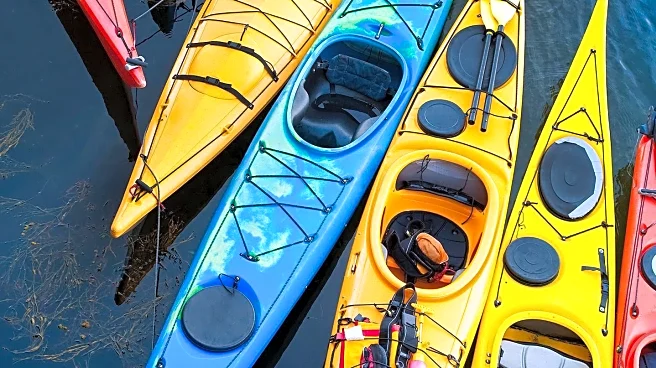What's Happening?
The City of Kissimmee has introduced self-service kayak rentals at Shingle Creek Regional Park, enhancing accessibility to outdoor activities. This initiative, in partnership with Whenever Watersports,
allows users to rent kayaks by scanning a QR code and following prompts on a mobile app. The service is available daily from sunrise to sunset, providing convenience for outdoor enthusiasts and families exploring the scenic waters of Shingle Creek, known as the headwaters of the Everglades. The program reflects Kissimmee's commitment to offering engaging and accessible recreational opportunities for residents and visitors.
Why It's Important?
The launch of self-service kayak rentals in Kissimmee represents a significant step in promoting outdoor recreation and tourism in the region. By leveraging technology to streamline the rental process, the city aims to attract more visitors and enhance the local economy. This initiative supports public health by encouraging physical activity and outdoor exploration, contributing to community well-being. Additionally, it aligns with broader trends in the recreation industry, where convenience and accessibility are increasingly prioritized. For Kissimmee, the program may boost its reputation as a destination for eco-tourism and outdoor adventures.
What's Next?
As the self-service kayak rental program gains traction, Kissimmee may explore additional partnerships and technological enhancements to further improve user experience. The city could consider expanding the service to other parks and waterways, increasing accessibility to outdoor activities across the region. Stakeholders, including local businesses and tourism agencies, will likely monitor the program's impact on visitor numbers and economic activity. Feedback from users may inform future developments, ensuring the service meets community needs and expectations.
Beyond the Headlines
The introduction of self-service kayak rentals highlights the growing role of technology in enhancing recreational services. By simplifying access to outdoor activities, the initiative may encourage more people to engage with nature, fostering environmental awareness and conservation efforts. Additionally, the program underscores the importance of inclusivity in public services, ensuring that recreational opportunities are accessible to diverse populations. Long-term, this development could influence urban planning and park management strategies, prioritizing sustainable and user-friendly solutions.










